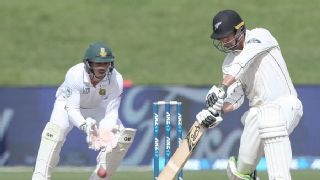|
"No Ross Taylor, no Trent Boult, what chance?" asked the Dominion Post ahead of the Wellington Test. None, was the answer. New Zealand were defeated inside three days and it was hard to tell who they missed more. Although the batting collapse made the headlines, a bowler like Boult might have been able to break the Temba Bavuma-Quinton de Kock partnership that seized the advantage from New Zealand's clenched fists and flung frustration in their face instead. Kane Williamson insisted that was just "one bad day" in a summer of 11 Tests, dating back to August, and that New Zealand could come to Hamilton with hope. But it seemed everything was against them. Six days before the match, it was confirmed that Taylor would not be available for selection because his calf tear had not healed. Two days before the match, Tim Southee joined him on the sidelines with a hamstring problem. A day before the match, Boult was also ruled out because his groin strain remained an issue. All five days of the Test were due to be affected by rain, three of them almost in their entirety. No Taylor, no Southee, no Boult, no hope for a full game. What chance? At first there was a fair chance for a repeat of the last match. New Zealand had South Africa under pressure at 190 for 6 and de Kock got them out of it, again. He was playing with an injured finger himself. Then it looked as though a draw could be the only result. Most of the middle session on the second day wasn't played because a brief - but heavy - shower needed almost two hours to mop up. The third morning was delayed by the same amount of time after an overnight drizzle, and New Zealand were still playing their first innings. By the time they took the lead, it was so late that there were effectively only two days left to force something, but Mitchell Santner seemed happy to spend both of them blocking.  Just 30 runs came in the first hour and fifteen minutes of the fourth day, and even though it was Williamson, captain and centurion at the other end, New Zealand seemed in no mood to rush, mostly because South Africa did not give them that chance. For the most part, South Africa bowled well. With an old ball on a pitch that didn't offer much, they could not really make things happen. They could prevent things from happening though, and they did. Their lines remained tight. Even with only a four-man attack at their disposal, they shared responsibility well, with the quicks rotating at one end and Keshav Maharaj operating at the other.
Just 30 runs came in the first hour and fifteen minutes of the fourth day, and even though it was Williamson, captain and centurion at the other end, New Zealand seemed in no mood to rush, mostly because South Africa did not give them that chance. For the most part, South Africa bowled well. With an old ball on a pitch that didn't offer much, they could not really make things happen. They could prevent things from happening though, and they did. Their lines remained tight. Even with only a four-man attack at their disposal, they shared responsibility well, with the quicks rotating at one end and Keshav Maharaj operating at the other.
It was only when the Kane pin fell - he was furious for top-edging a pull - when Santner's stubborn stay ended the ball before lunch, and the lead approached 100, that an unlikely hero emerged: Colin de Grandhomme. When de Grandhomme took 6 for 41 on debut, he was knighted a working-class hero - a bowler who did not reach great speeds, get great swing or generate great bounce, but somehow had a great game. Usually those types do one amazing thing and then go back to trying hard. De Grandhomme seemed headed that way. He would be a workhorse, to be called on when needed and overlooked when not, no dramas. He was left out of the first Test, was asked to open the bowling and did it pretty well in the second, and was placed in the slip cordon in the third. He had hardly justified his billing as an allrounder though, with his batting hidden until this innings. Sure, he was batting against an attack that had spent nearly 140 overs in the field and would go on to spend another 22, so it was hardly the most fire he will face. Sure, he had reprieves when the likes of Dean Elgar and Bavuma were asked to relieve the specialist bowlers. And sure, he had the licence to attack. But he did it well. De Grandhomme accelerated at the right time, struck the ball cleanly and ensured New Zealand's lead was enough to become troublesome. Then he opened the bowling with the kind of discipline that taxes any batsman who has spent 12 hours in the field. He tested their tired minds and Dean Elgar's was spent. So too was Hashim Amla's. The mix-up that caused the run-out of Theunis de Bruyn came the over after de Grandhomme was replaced by Wagner, who managed not to send down a short ball for an entire over to leave Amla wondering when the surprise was coming. No wonder he wanted to get off strike. And it was de Grandhomme who accepted the catch when Amla chased the width offered by Jeetan Patel. New Zealand will need more of their players to be like de Grandhomme on the final day. South Africa have been in situations like this before and not simply gone away. Faf du Plessis has been in situations like this before and batted out time, exhausting the opposition's attack. De Kock doesn't care what the situation is, he can change it on his own in a short space of time. As long as they are there, South Africa are in it. But even with no Taylor, no Boult, no Southee and perhaps rain, New Zealand have every chance.
|

